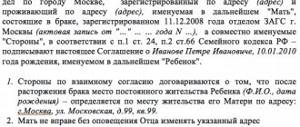Who can become a guardian?
Requirements for guardians and trustees are established by law. Moreover, they are described in 3 regulations at once (Article 35 of the Civil Code of the Russian Federation, Article 146 of the Family Code of the Russian Federation, Article 10 of Law No. 48 of 2008 “On Guardianship”).
Basic conditions:
- Reaching the age of majority (18 years) and full legal capacity. A citizen cannot be recognized as emancipated by a judicial or administrative procedure. Reaching 18 years of age is a requirement.
- Having a regular income . Moreover, the amount of monthly income is not established. The citizen must provide information for 12 months. This could be information about pensions, salaries, remuneration, benefits.
- Availability of rights to living space . The law does not limit a person’s types of housing rights. This may be ownership, free use, or rent.
- Candidate's consent . The law does not provide for the possibility of establishing guardianship against the will of the guardian. The citizen must express consent in writing.
- Availability of parental rights . A person cannot be deprived of the rights of a parent or limited in them. Also, a candidate’s natural children cannot be taken away through his fault and adoption cannot be cancelled.
- No criminal record . A candidate cannot have an unexpunged or unexpunged conviction, or a conviction for a serious or especially serious crime.
- Lack of official marriage with a person of the same sex . Although registration of same-sex marriages is prohibited in the Russian Federation, according to the laws of other countries, the conclusion of such unions is possible. Representatives of such unions cannot obtain the right to family placement for any children, including disabled people. Since this is propaganda of same-sex love.
- Availability of the child's consent . If a disabled child can understand the consequences of his actions, then family placement for a minor over the age of 10 is possible only with his consent.
Can a disabled person be the guardian of a disabled child?
Expert opinion
Stanislav Evseev
Lawyer. Experience 12 years. Specialization: civil, family, inheritance law.
Citizens often wonder whether a disabled person can be a guardian. The law restricts the right to accept a minor child into a family only to disabled people of group 1. But it also stipulates a number of diseases that prohibit obtaining an opinion on the possibility of being a substitute parent. Moreover, it is not necessary to have a disability due to these diseases.
Government Decree No. 117 dated February 14, 2015 includes the following diseases in the list of diseases that prevent the receipt of a conclusion:
- tuberculosis;
- all types of cancer;
- alcoholism;
- drug addiction;
- substance abuse;
- infectious diseases.
However, the law provides for the right of a citizen to go to court to challenge the refusal of the guardianship department. If a child, at the time of registration of a family arrangement, lives with the applicant for a long time, then the court, in the interests of the child, may decide on the need to issue an opinion.
Example . Citizen X. filed a lawsuit to cancel the conclusion about the impossibility of being a candidate for guardian. The guardianship department indicated that the plaintiff had cancer as the basis for the refusal. At the time of going to court, the woman was undergoing chemotherapy. The girl lived with the candidate’s family for more than 3 years. The plaintiff's husband was her guardian. After his death, guardianship is automatically terminated. The girl had a disability due to cancer. The woman justified her demand by saying that a change of environment would be traumatic for the child. The court took into account the circumstances and satisfied her demands.
The law establishes additional requirements for guardians of a disabled child. For example, the guardianship department may require a separate room for the ward, the candidate has free time, and experience in caring for patients.
Custody under report
— My son is 28 years old, he is disabled from childhood, group 1 (cerebral palsy). The son is declared incompetent because he cannot sign to receive a pension, is completely physically dependent on others, and needs constant outside care.
In connection with the new requirements of Federal Law N 48-FZ “On Guardianship and Trusteeship” dated April 24, 2008, I must annually draw up a guardian’s report, report on the pension payment paid to him, attaching sales receipts.
How should I divide the items I buy daily, such as meat? How can you give your son a portion of the refrigerator, TV, and washing machine purchased for the family? Write out a sales receipt at a pharmacy, market, or in stores? That's bullshit! When should I take care of my children and family if I collect sales receipts every day and divide them among everyone, who gets what share? I work, I have a younger son, he also needs attention. This law gives nothing to my sick son except unnecessary problems for me.
I couldn’t find the text of the commentary to the law anywhere on the Internet; Krasheninnikov’s commentary can only be purchased in printed form. Why not post a comment on the State Duma website for everyone to see?
Reznikova Irina Aleksandrovna,
Novoaltaysk,
Altai region
— I share your indignation caused by the requirement of the new Federal Law “On Guardianship and Trusteeship” to submit a guardianship report. This requirement not only makes it much more difficult for the guardian to carry out his main task of assisting the ward and protecting his rights and interests, but can nullify the desire of citizens to formalize guardianship.
- Then why is such a requirement established?
— The guardian’s obligation to submit an annual report is established in order to strengthen his responsibility. According to paragraph 1 of Art. 25 of the Federal Law, the guardian is obliged annually no later than February 1 of the current year, unless another period is provided for in the guardianship agreement, to submit to the guardianship and trusteeship authority a report in writing for the previous year on the storage, use of the ward’s property and management of his property, with documents attached (copies of sales documents). checks, tax receipts, insurance amounts and other payment documents). It is quite obvious that the need to focus on collecting sales receipts, receipts, etc., due to the task of control, to put it mildly, distracts the guardian from the main thing - creating conditions for the incompetent person to live in the family and protecting his rights and interests.
In accordance with paragraph 2 of the same article, the guardian’s report must contain information about the condition of the property and the place of its storage, the acquisition of property to replace alienated property, income received from the management of the ward’s property, and expenses incurred at the expense of the ward’s property. In addition, the guardian's report must also indicate the dates of receipt of amounts from the ward's account and the dates of expenses incurred from these amounts for the needs of the ward.
It turns out that compliance with the listed requirements places an unreasonably heavy burden on the guardian, who, in addition to everyday worries about the ward, must first of all think about how to confirm every penny spent on the ward.
— Doesn’t the law provide at least some exceptions for families raising a disabled child?
- Unfortunately no. For cases such as yours, when guardianship is established to protect the rights and interests of not a stranger to you who, for health reasons, needs help and protection, but in relation to your own son, who has been a member of your family since birth, no exceptions are provided. And this, in our opinion, is a serious miscalculation of the legislator.
Establishing the control functions of the guardianship and trusteeship authorities over the actions of guardians in disposing of the property of wards, the law should have made a distinction between a person outside the ward appointed as his guardian and the parent who has taken custody of the incapacitated child.
On September 17 of this year, parliamentary hearings were held in the State Duma on the topic “The practice of applying the Federal Law “On Guardianship and Trusteeship”: a year from the date of entry into force,” at which critical remarks were made in connection with the application of certain provisions of this law, including Article 25. Will these comments contribute to making changes to the Federal Law, and in particular to Art. 25, time will tell.
Lyubov Maksimovich, senior researcher at the Institute of State and Law of the Russian Academy of Sciences, candidate of legal sciences, associate professor.
appointment with a lawyer
- I have been married since October 2006, and now we are getting a divorce due to dissimilarity of characters, and my wife is suing for the division of property, which includes the apartment in which we now live, our cars and household items. The apartment was purchased after the marriage was registered. But I bought it with my own money at the beginning of 2007. The money was in my account, opened in August 2006 after the sale of my parents' house. The wife has nothing to do with the purchase of this apartment or any other property. Everything was bought with my money, but she doesn’t work at all, she only spends my money! Tell me, can she claim my apartment?
Ilya Alexandrov, Moscow.
— Ilya, if the property was acquired (not received as a gift or inherited) during the marriage, then it belongs to jointly acquired property, with the exception of the property that was acquired with the personal funds of one of the spouses received by him before marriage. That is, this is exactly your situation. You had the money before the marriage was registered. This means that only you are the owner of what was purchased with this money after the marriage was registered (apartment). Now you need to prove that the apartment was purchased with your funds, which have been in your account since August 2006. But this is rather a technical point; you can, for example, request statements of accounts, where the movement of money will be visible - when the money was deposited, when and what amount was withdrawn, etc.
— Tell me, how will the court divide the rest of the property? Equally? She didn't work at all.
— The fact is that the Family Code assigns equal rights to property acquired during marriage to both the working spouse and those who run the household, care for children, or for other valid reasons cannot receive independent income. This provision of the law is, in principle, necessary in order to protect women mothers. And, in my opinion, it is very fair.
“But we don’t have children and in fact she doesn’t run any household.” We still have two cars, one of them I bought a year ago for my wife, and the second one was given to me by my parents after the wedding. It turns out that the one that was given to me is not joint property, because it is a gift, right?
- Not really. Difficulties will arise if this gift is not legally formalized.
Anastasia Rastorgueva, lawyer.
How to obtain guardianship of a disabled child
Raising a disabled child is a complex process that requires a significant amount of resources. A large amount of money is required for proper care and education.
Although the law provides for free medical care, the provision of rehabilitation aids and monthly pension payments, in practice, expenses significantly exceed income. Therefore, parents do not always cope with the assigned responsibility for material maintenance.
There may be several reasons for obtaining guardianship over a disabled child:
- his parents abandoned him in the maternity hospital;
- mother and father do not fulfill their duties;
- parents earn money to meet the needs of the child and cannot personally care for him;
- the citizen has reached 18 years of age and is declared legally incompetent.
Important! Guardianship can only be assigned to a child under 14 years of age and to a person deprived of legal capacity by a court order.
with living parents
Raising a disabled child places a heavy burden on the shoulders of the mother and father. Not every parent is ready to take such a test. Therefore, they can abandon the baby immediately after birth, while still in the maternity hospital.
In addition, a situation is possible when parents cannot cope with upbringing in the process. Not everyone can provide specialized care.
If the guardianship department determines that the mother and father do not fully satisfy the needs of the minor, then they may be deprived or limited in parental rights. After the court decision enters into legal force, the child is transferred to the guardian’s family for upbringing.
First of all, specialists interview the relatives of the potential ward (grandparents, brothers, sisters). If no citizens are identified who are ready to accept him into the family, then the minor is transferred to be raised in the family of strangers.
In 2021, there has been a significant increase in cases of registration of family education for unrelated children with disabilities on the territory of the Russian Federation. During the year, several cases of guardianship of children with Down syndrome were recorded.
with the consent of mother and father
Maintaining and meeting the needs of a disabled child requires additional costs. Therefore, mom and dad must find additional ways to earn money.
Often this solution is to work on a rotational basis. However, a minor cannot be left without parental care.
Therefore, the law provides for the need to formalize guardianship at the request of the parents. The mother and father independently choose a guardian. As a rule, the grandmother becomes the child's representative caring for him.
The law provides for temporary guardians requirements similar to the conditions for a permanent placement. Therefore, the woman will also have to draw up a conclusion on the possibility of becoming a candidate and receive an order to appoint guardianship.
The guardianship department may refuse to register a grandmother as a substitute family for a disabled grandson if her moral character does not meet the requirements for a substitute parent. An additional condition will be the ability to provide proper care.
Thus, grandmothers who work night shifts, have a daily work schedule, or have been repeatedly brought to administrative responsibility cannot become guardians of disabled children.
after 18 years
Guardianship over an incompetent person and over a minor is formalized differently. Even if guardianship has been issued over the child, upon reaching the age of 14, its validity ends.
To re-register, you must go to court and declare the disabled person incompetent. The prosecutor's office, the guardianship department and close relatives have the right to go to court.
The issue will be resolved through special proceedings. During the process, a sanity examination is required.
If the requirements are satisfied, the court decision is given legal force within 30 days. After which the plaintiff has 30 days to obtain guardianship. Otherwise, the disabled person will be transferred to the care of a specialized organization.
A person who has lived with a disabled person for the last 10 years has preferential conditions for obtaining guardianship. He will need to provide a minimum package of documents, which includes a civil passport, information about income and information about the presence of family ties.
How to properly arrange guardianship for a disabled child?
The guardianship authorities for children with disabilities are exclusively concerned with placing them in families. To obtain rights to raise and guardianship a child, you need to contact a special institution located in the region where the center or orphanage is located with the appropriate documents and application.
After the application is received by the guardianship authorities, they will inspect the living conditions in which the disabled child will live. Within 15 days after the review, employees must make decisions regarding consideration of the candidacy.
Before the child actually moves into the family, the future guardian must attend the appropriate classes at the special education program or school.
List of documents for a guardian of a disabled minor
The list of documentation varies depending on the age of the potential ward. Let's consider what data a candidate for guardianship of a disabled minor needs to prepare.
| No. | List of data |
| 1 | Passport |
| 2 | Certificate of income for 12 months |
| 3 | Medical report |
| 4 | Title document for housing |
| 5 | Statement from personal account confirming absence of debts |
| 6 | Written consent of all family members |
| 7 | Certificate of completion of training |
| 8 | Autobiography |
| 9 | Marriage document (if available) |
| 10 | Conclusion on the possibility of being a candidate for surrogate parents |
List of documents
The list of documents that must be attached to the application depends on the age of the disabled person over whom guardianship or trusteeship is being issued: for a disabled minor child - one package of documents, for an adult disabled person deprived or limited in legal capacity - another package of documents.
Documents of a guardian/trustee for a disabled child (according to the Rules for the selection and training of guardians..., approved by Decree of the Government of the Russian Federation No. 423 of May 18, 2009):
- passport;
- autobiography;
- medical report;
- document (certificate, order) at the place of work with information about the position held, income for the last 12 months;
- document (certificate, extract from the house register, rental agreement or certificate of ownership) at the place of residence;
- certificate of completion of the preparatory course;
- written consent of relatives and family members living together.
Documents for a disabled child:
- birth certificate or passport;
- consent to guardianship (if the disabled child is over 10 years old);
- medical report;
- conclusion (certificate) of MSEC;
- individual treatment and rehabilitation program;
- insurance policy;
- documents (agreements, certificates of ownership) for property belonging to the child;
- documents confirming the lack of parental care (refusal or application of parents for temporary guardianship/trusteeship, a court decision on the deprivation of the mother and father of freedom, restriction or deprivation of parental rights, restriction or deprivation of legal capacity, recognition as missing, a decision of the public educational organization on the removal of a disabled child from families (according to Article 77 of the RF IC), a resolution of the Public Prosecutor’s Office on granting a disabled child the status of “left without parental care.”
Documents of a guardian/trustee of a disabled person who has reached the age of majority (in accordance with the Rules for the selection and training of guardians..., established by Decree of the Government of the Russian Federation No. 927 as amended on December 21, 2018):
- passport;
- autobiography;
- marriage certificate (if the guardian/trustee is married);
- a document confirming the relationship with the disabled person under his care;
- document (certificate) at the place of work with information about the position, income for the last 12 months;
- pensioner's ID;
- medical report;
- written consent of all relatives of family members, including children over 10 years old (if the disabled ward will live with them);
- certificate of completion of the preparatory course.
Important! If the guardian or trustee is a close relative of a disabled adult (mother or father, grandmother or grandfather, brother or sister) or a person who has taken care of him in the last 10 years, the list of documents can be significantly reduced. See “How to obtain guardianship over a disabled person of groups 1, 2, 3”
Documents for an adult disabled person deprived or limited in legal capacity:
- passport;
- medical report
- MSEC certificate;
- insurance policy;
- individual treatment and rehabilitation program;
- documents on ownership of property owned by a disabled person.
In addition, the OOP requests documents and verifies the following information:
- criminal record certificate;
- certificate of the amount of pension, benefits, payments and benefits;
- a certificate of family composition at the place of residence or an extract from the house register.
List of documents for a guardian of an incapacitated person
The list of information for the guardianship department varies for different categories of guardians.
| Title of the document | Close relatives | Strangers |
| Passport | + | + |
| Medical report | + | + |
| Certificate of income for 12 months | — | + |
| Marriage document (if available) | + | + |
| Consent of family members | — | + |
| Certificate of completion of specialized training | — | + |
| Document confirming the presence of a family relationship | + | — |
List of documents for a minor ward
To register guardianship, documents are provided not only by the candidate, but also by the potential ward. The list of documentation is prepared by the legal representative of the minor (guardianship department, parents, head of the orphanage).
Sample list:
- birth certificate;
- civil passport (if available);
- medical report;
- ITU certificate;
- individual rehabilitation program;
- information about the management of the mother's pregnancy and childbirth;
- medical insurance;
- SNILS;
- refusals from relatives;
- information about adult and minor relatives;
- information about parents (court decision on deprivation of rights, personal statement of mother and father);
- information about the child’s property;
- act of examining the life of a minor.
Regional support for carers
Most types of support are provided at the regional level. For example, the following types of assistance are available for Moscow residents:
- Compensation for utilities.
- Financial assistance for caring for a disabled person.
- Compensation for raising an abandoned child.
Depending on their place of residence, citizens have the right to independently determine support measures. A full list of services is available from your local social security office. A complete list of necessary documents for registration of guardianship is also established on site.
Documents ordered by the guardianship department
Not all data must be prepared by the potential candidate and the representative of the mentee. A number of information is prepared by a specialist from the guardianship department.
These include:
- To register the placement of a minor ward . Information about the candidate’s criminal record, an extract from the house register, information about the availability of a pension. Information about the amount of the pension is ordered for the child.
- When placing an incapacitated ward . Information about the candidate's criminal record, an extract from the house register, information about pension. In relation to the potential ward, information about the amount of the pension and an extract from the house register are additionally ordered.







